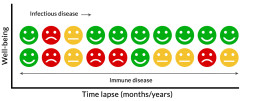Our immune system
Our immune system, also known as the immune system, protects us against pathogens. The system is ingenious, but does not always work flawlessly. Sometimes the intruder just outsmarts us, sometimes the system itself gets confused and targets healthy parts of our body. Science is looking for ways to help the system. *
Below is a diagram of how our immune system works globally**: First of all, good hygiene (e.g. washing hands!) is important for keeping intruders out. The first barrier of our immune system are the skin and mucous membranes. If pathogens do enter, we call it an infection.
At that moment, the immunomes and proteins come into action: this is the inflammatory response (inflammation). This sometimes includes symptoms that cause a sick feeling, such as fever and pain. However, this is a normal immune system response and, if all goes well, temporary.






mucous membranes
intruders out
immunoproteins
Alert
Mobilize
Destroy
Tidy





recognize intruders
bacteria



* Source: https://www.knaw.nl/nl/thematisch/de-nederlandse-wetenschapsagenda/gezondheid-en-voeding/kunnen-wij-onze-afweer-beter-afstellen
** See also: http://www.immunowell.com/geneeskunde-perspectief/
What if there are problems with our immune system?
Infectious diseases
- Your body usually becomes temporarily ill in response to an intruder, with or without a good outcome
- Depending on the type of ‘intruder’, you can get inflammation in different places in your body and / or feel generally sick.
- Examples are flu, colds and diarrhea, but also more violent invaders that cause pneumonia, Ebola, etc. There are an incredible number of possible invaders and just as many infectious diseases that you can get from them

Immunity diseases
- Your immune system is chronically out of balance > Chronic Immune Disorder
- There are roughly four possibilities for Chronic Immune Disorder:
- The immune system is too weak and does not focus sufficiently on external factors, making you more susceptible to infections (immune deficiency diseases such as AIDS, Leukemia)
- Primary = congenital
- Secondary = later emergence
- The immune system is too weak and does not focus sufficiently inwards (no clearing of wrong cells such as cancer, e.g. Non Hodgkin)
- The immune system is too strong and focuses inwards (autoimmune diseases). Eg:
– Multiple Sclerosis
– Rheumatoid Arthritis
– Crohn’s and others IBD
– Psoriasis
– Alzheimer’s (probably)
– Parkinson’s (probably)
– COPD - The immune system is too strong and focuses on external factors (allergies, asthma)
- The immune system is too weak and does not focus sufficiently on external factors, making you more susceptible to infections (immune deficiency diseases such as AIDS, Leukemia)
